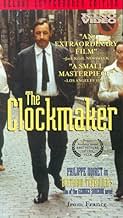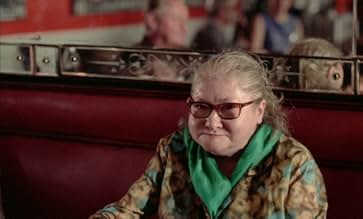Agrega una trama en tu idiomaA watchmaker finds out one day that his son has become a murderer. He tries to understand for whom and why.A watchmaker finds out one day that his son has become a murderer. He tries to understand for whom and why.A watchmaker finds out one day that his son has become a murderer. He tries to understand for whom and why.
- Dirección
- Guionistas
- Elenco
- Premios
- 4 premios ganados y 1 nominación en total
Opiniones destacadas
The lonely, simple life of Michel Descombes (Philippe Noiret), a clockmaker who lost his wife years ago, changes when hears that his grown-up son murdered a man and is on the run with his girlfriend. Michel is shocked and questions his upbringing, while a nice police inspector (Jean Rochefort) shows much sympathy for him.
Tavernier's shining debut and co-operation with New Wave veterans Aurenche and Bost brings a novel by Simenon on screen. It's a work of old-fashioned concision that the mechanic of the title would have been more than proud of. It is more a psychological study than a crime drama, because there is next to no outer plot. The happenings are taking place in the head of Michel, the father, masterly played by Philippe Noiret, who suddenly gets confronted with the serious actions of his son. He becomes aware of how little he knows about him, although they used to be together all the time. The focus is less on the murderer nor on the victim, but more on what the catastrophe means for the father of the committer, in a powerful work of authenticity.
Tavernier's shining debut and co-operation with New Wave veterans Aurenche and Bost brings a novel by Simenon on screen. It's a work of old-fashioned concision that the mechanic of the title would have been more than proud of. It is more a psychological study than a crime drama, because there is next to no outer plot. The happenings are taking place in the head of Michel, the father, masterly played by Philippe Noiret, who suddenly gets confronted with the serious actions of his son. He becomes aware of how little he knows about him, although they used to be together all the time. The focus is less on the murderer nor on the victim, but more on what the catastrophe means for the father of the committer, in a powerful work of authenticity.
I'm a big fan of director Bertrand Tavernier. For me, he's the best French director of the past 30 years. This is one of his early works of the seventies and it had all the elements that makes the great personality of his films. Above all : a great sense of reality. Sometimes, his movies looks like they were improvised, but, in fact, it can't really be. This one is like an emotional crescendo. In the begening, we didn't really know what's going on and what kind of man Philippe Noiret is playing. In the middle, we had a great idea, but we don't know that the last minutes will be so full of intense emotions. The great Noiret and Tavernier will make several other movies together. This is one is among the best.
This film is a brilliant portrayal of a man caught between his private memories of a fugitive son and the political interpretations of his son's actions. There is a constant interplay between Michel Descombes's private existence, individualized profession (as an artisan, he is necessarily the opposite of a mass producer), and the public spectacle that his son has become. It is truly a fascinating commentary on subversion and freedom, wonderfully played by Noiret and other greats, that provides incredible emotional depth.
Bernard Tavernier once confessed that the greatest influence in his life had been the work of directors Akira Kurosawa and Michael Powell. This might explain his direction of the film based in the novel by Georges Simenon's.
It shows a Tavernier more concerned with the character study of M. Descombes, as he goes through the horror of understanding what had caused his son to commit the crime of which he is been accused of perpetrating. In doing so, M. Tavernier embraces the "old French cinema", as he shuns away the New Wave methods of story telling.
One can see clearly what's going on in Descombes' mind, at all time. His son has grown up and is not a child anymore. We see this father come home and encounters newspaper reporters and he goes into his son's room and lays down in the bed that perhaps the younger man has not slept in for quite some time. We watch as Descombs descends into hell because he can't comprehend what has triggered his son into doing what seems repugnant to him and his dignity.
Pilippe Noiret was born to play Descombes. This actor with such subtlety, underplays the clockmaker, and the father. What comes to the surface is the inner turmoil that Descombes is experiencing. This is another example of how good an actor M. Noiret is because with an economy of gestures he builds the character. Jean Rochefort, as the inspector, is also good. M. Rochefort is another actor that always surprises.
This movie is a psychological portrait of a man at the crossroads of despair. Only at the end, father and son seem reconciled with one another. The city of Lyons has been photographed lovingly in this film.
This is a Tavernier for discriminating tastes.
It shows a Tavernier more concerned with the character study of M. Descombes, as he goes through the horror of understanding what had caused his son to commit the crime of which he is been accused of perpetrating. In doing so, M. Tavernier embraces the "old French cinema", as he shuns away the New Wave methods of story telling.
One can see clearly what's going on in Descombes' mind, at all time. His son has grown up and is not a child anymore. We see this father come home and encounters newspaper reporters and he goes into his son's room and lays down in the bed that perhaps the younger man has not slept in for quite some time. We watch as Descombs descends into hell because he can't comprehend what has triggered his son into doing what seems repugnant to him and his dignity.
Pilippe Noiret was born to play Descombes. This actor with such subtlety, underplays the clockmaker, and the father. What comes to the surface is the inner turmoil that Descombes is experiencing. This is another example of how good an actor M. Noiret is because with an economy of gestures he builds the character. Jean Rochefort, as the inspector, is also good. M. Rochefort is another actor that always surprises.
This movie is a psychological portrait of a man at the crossroads of despair. Only at the end, father and son seem reconciled with one another. The city of Lyons has been photographed lovingly in this film.
This is a Tavernier for discriminating tastes.
The star of this film is the city of Lyons, which looks absolutely magnificent. The problem with the film is that it rambles along until the son is finally captured and tried, and is reconciled with his father. The father doesn't seem to know what's going on at the start or how he feels about his son, before eventually deciding that he wants him to escape. But the film just seems to drift from one encounter to another, with the policeman, with his friend, with the press, with his son's girlfriend's workmates, with the woman who helped bring his son up. Perhaps the director is trying to show what it's like to be waiting for news in such a situation and the sense of not being able to do anything about it. Philippe Noiret and Jean Rochefort are both excellent in portraying sympathetic characters. The son and girlfriend are also portrayed as sympathetic - although we are never explicitly told why they committed the murder, their victim is shown to have been a nasty piece of work. The almost documentary style is in contrast to the cinematic style of other Simenon adaptations such as "Monsieur Hire" and "The Hatter's Ghost". No intrusive music as in "Monsieur Hire" for example.
¿Sabías que…?
- TriviaThe house where Michel meets the old lady who took care of his son is the house where Bertrand Tavernier lived his childhood with his parents during WWII. René Tavernier was a friend of Louis Aragon and Elsa Triolet.
- ErroresAt 33:08' a waiter enters the police station with a tray with four beers. Camera cuts to the adjacent office and when it returns, there are only two beer bottles left.
- Créditos curiososto Jacques Prevert
- ConexionesEdited into Le documentaire culturel: Le siècle de Simenon (2014)
Selecciones populares
Inicia sesión para calificar y agrega a la lista de videos para obtener recomendaciones personalizadas
- How long is The Clockmaker?Con tecnología de Alexa
Detalles
- Tiempo de ejecución1 hora 45 minutos
- Mezcla de sonido
- Relación de aspecto
- 1.66 : 1
Contribuir a esta página
Sugiere una edición o agrega el contenido que falta

Principales brechas de datos
By what name was L'horloger de Saint-Paul (1974) officially released in India in English?
Responda
![Ver Bande-annonce [OV]](https://m.media-amazon.com/images/M/MV5BZTA2YTQxYjYtNTE3NS00NTg0LWFiMjItMzgyMmZjYzdhMTJlXkEyXkFqcGdeQXRyYW5zY29kZS13b3JrZmxvdw@@._V1_QL75_UY281_CR6)




























